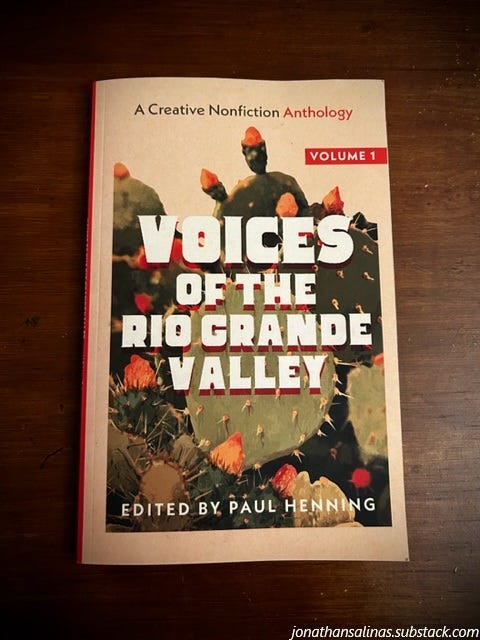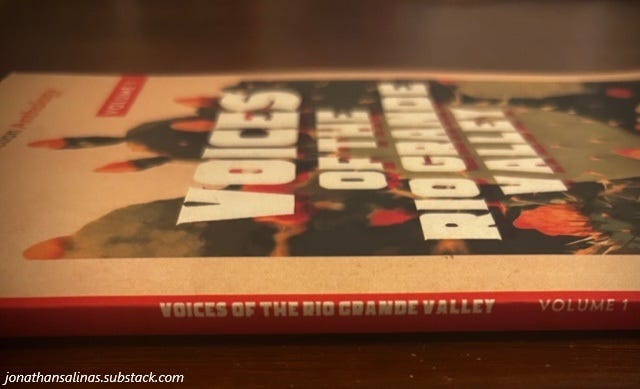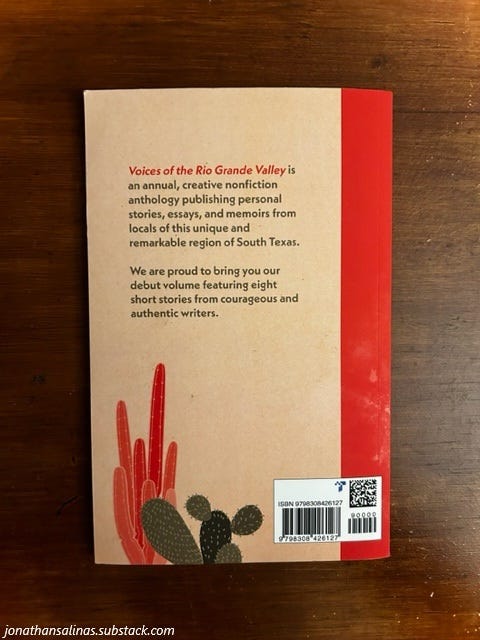Book Review: Voices of The Rio Grande Valley
New creative nonfiction anthology, featuring a piece by yours truly, hits the shelves
A new anthology of memoirs pertaining to the Rio Grande Valley was published last month. It was edited by Paul Henning, a native of the region who grew up in Mission. As his brother Thomas—who contributed to the collection—says in his short story, while he cannot visit the area as much as he would like or bring his new friends to the place he and his descendants called home, the collection attempted to—and I’m certain surely succeeded in—bringing the Rio Grande Valley and its many wonders to his friends and many others worldwide.
The lovely and short collection is nicely packaged, bearing a charming design that pays tribute to the native cactus that outlines the thorn shrub and brushlands those who have lived here for some time carry in their hearts and the deepest burrows of our psyches. It’s about 90 pages, including the forward and afterward that contains biographies of the contributors. The collection consists of eight entries, including one from yours truly, from an array of unique voices and perspectives. Among them is Maria Elena Portillo, a 76-year-old retired paralegal who was raised in McAllen in the sixties; Kayla Limones, a university student at Trinity; Miranda Marie Hernandez, a homeschooling mother; Martin E. Marizcal, a working-class writer who studied English at Texas State; Mercedes Olague Hernandez, a native of Brownsville who holds an MFA; the aforementioned Thomas Henning; and myself.
The collection is perfect to read in one sitting, as I did in exactly three hours, over a weekend day or a free evening. Almost every piece—with the particular exception of my quite political and slightly impersonal contribution—contain the essential elements of nostalgia, old-time history of the region, vivid childhood and family recollections. The absolute star, by far, of the collection is Ms. Maria Elena Portillo whose two contributions begin and end the book. Not only does she write absolutely perfect sentences, she writes absolutely perfect paragraphs.
Portillo’s two pieces—Memoirs of El Mexico Cafe and Cine El Rey—are as brilliant as they are vivid, hilarious, real and loyal to the truth. Portillo accomplishes the daunting task of making you feel as if you’re right there in her shoes, living her childhood experience in the classic downtown McAllen of old, without becoming boring. I laughed so hard at several points while reading both pieces, I’m certain to have disturbed my upstairs and next door neighbors while reading the collection at the ungodly hours of between 1 a.m. and 4 a.m. Portillo not only gives the characters in her true stories the life and color they deserve, but also makes excellent contributions to the history of the region, recounting the making (and unmaking) of historic landmarks like Cine El Rey, Rex Cafe and El Mexico Cafe, while remaining faithful to the personal narrative.
Her first piece is a bit of a roller-coaster, beginning by making the reader almost feel quite sorry for her and the poverty she grew up in, until introducing the unsettling irony of being introduced to a poorer Anglo classmate who was far worse off than she ever was. In her second, the last of the book, Portillo for me fills in blanks I always had in my knowledge about what the old Cine El Rey was like. Listing numerous examples of the films, and actors, as well as community talent shows that used to be held there (“the golden age of Mexican cinema”), she offers (what I would list as) an example of what early communists in the Soviet Union like Leon Trotsky argued that cinemas do, and that is, broaden the cultural horizons of the working-class by allowing, as she puts it, “our community to escape from the poverty many of us lived in. (pg. 66)”
My own contribution, Rio Rojo, is about how as a political activist and organizer in the region who started out trying to get progressive Democrats elected to office in Texas I instead saw the Rio Grande Valley go from being deep blue to “grapefruit ruby red.” I start by describing my experience at the now deceased Yerberia Cultura on S. 17th Street, which coincidentally lines up with Portillo’s contributions in that the two establishments she focused on were on the same street, and end with my witnessing the first Latina and Republican become the first elected representative of Congress in the region. I suppose in another sense, though far more political than personal, my piece in the end lines up with the pieces by Portillo, Henning and others who describe a changing region, paying tribute to a rural RGV that—we have to face it—is mostly gone and is never coming back. Adios to the brushlands, as is the title of a great book about the region. Another interest fact about the contributors, the full significance of which I have not been fully able to wrap my mind around, is that half of us either reside or resided for a significant period in the city of Edinburg. It might seem like an innocuous detail, but I think there’s something there worth exploring.
As I read Portillo’s closing words, in her closing piece, her descriptions of how she can still see in her mind’s eye the people she loved and the things they used to do at the places she still loves and occasionally visits, I was met with the unwelcome but no-less valid reflection that capitalist development, and history, are a bitch. But don’t let that stop you from ordering this essential collection that belongs in every museum of history in the RGV as well as every public library.






